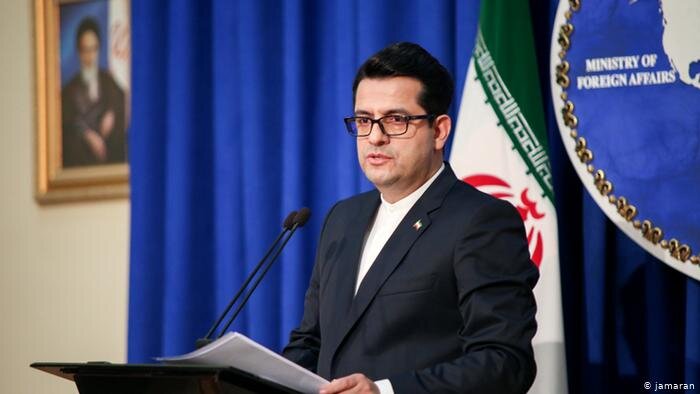Tehran welcomes rapprochement with Riyadh

TEHRAN – Foreign Ministry spokesman Abbas Mousavi on Monday described as a “positive signal” a call by Riyadh for talks with Tehran, calling on all Muslim countries to set aside their differences to move forward.
“We regard this move as a positive signal and our reaction to any positive signal would be positive,” Mousavi said during a press conference in Tehran.
“The Islamic Republic welcomes any initiative that aims to bring Muslim countries together because we have common enemies,” he said.
He also lauded the United Arab Emirates’ decision to pull its forces out of Yemen as a good step in reducing regional tensions, saying Iran would help as much as it can in this path.
U.S. not after fruitful dialogue: Mousavi
Asked about the implications of Foreign Minister Mohammad Javad Zarif’s nuclear offer to the U.S. in return for lifting of sanctions, Mousavi said Iran has said on numerous occasions that talks are possible “only if we could get some tangible and practical results out of it.”
The U.S. officials’ remarks about holding talks with Iran are “just a show and they lack seriousness in their proposals,” the spokesman remarked.
“If they are truly after negotiations, what has been put forward (by Iran) can be discussed and is accessible. But as we had predicted, the proposal was opposed by the Americans because they are not after a dialogue which could in fact lead to tangible outcomes.”
Zarif, on a recent visit to New York, noted that in 2023, under the JCPOA, Iran’s parliament, the Majlis, was supposed to ratify the Additional Protocol to the NPT, a voluntary agreement that allows IAEA inspectors extensive access in Iran to ensure the country does not have a covert nuclear weapons program. As part of the JCPOA, Iran already observes the protocol. Ratification by the Majlis would make it a more permanent commitment.
At the same time, under the JCPOA, the U.S. Congress was due to lift sanctions on Iran.
Zarif proposed that the Iran and U.S. take those steps immediately.
“If Trump wants more for more, we can ratify the Additional Protocol and he can lift the sanctions he set,” Zarif said. “He has said that he will take any measure to Congress – fine. Lift the sanctions and you’ll have the Additional Protocol sooner than 2023.”
JCPOA meeting in Vienna was ‘constructive’
Mousavi also commented on the Sunday JCPOA meeting in Vienna, attended by Deputy Foreign Minister Abbas Araqchi, saying the meeting was “constructive” and that diplomatic efforts will continue by all sides to save the 2015 nuclear agreement.
“Diplomatic efforts will continue to save Barjam (JCPOA), which is important both to us and the remaining signatories to the deal,” he said.
He added that during the meeting, the Europeans objected to Iran’s reduction of its commitments to the JCPOA, while the Iranian side voiced its strong objection to Europe’s inaction in offsetting sanctions as well as their detainment of some Iranians.
“Iran’s measures to reduce its commitments are serious, and if the current situation continues as it is, we will take our third step, which would be much stronger than the previous two,” he asserted.
‘Case of Asadi is complex’
The spokesman was asked to give details of the latest developments surrounding the detention of Iranian diplomat Asadollah Asadi in Belgium.
Asadi was arrested in Germany in June 2018 on the false charges of being linked to a bomb attack plot in the French capital, Paris. In October 2018, prosecutors said Germany had extradited the Iranian diplomat to Belgium.
According to Belgian authorities, the Iranian diplomat had been arrested along with a 38-year-old man and a 33-year-old woman, suspected of plotting a bomb attack on a meeting of the terrorist Mojahedin-e Khalq (MEK) in Paris, attended by U.S. president’s lawyer, Rudy Giuliani, and several former European and Arab ministers.
Mousavi said the case has technical, legal and diplomatic complexities and Iran is pursuing the issue politically and legally.
He also expressed the hope that the Iranian diplomat would be released soon.
Britain’s seizure of supertanker ‘unacceptable’
On seizure of a supertanker carrying the Iranian oil, he said it is “unacceptable” that a European country “confiscates our oil on the orders of the U.S.”
“We regard this measure as a violation of Barjam,” he stated.
He also said the issue was brought up by Iran during the Sunday meeting in Vienna, where the sides did not reach an agreement on the issue.
The British government’s move was “an illegal move and a bad political decision and we hope they reverse their decision as soon as possible and release the oil tanker,” he added.
Britain captured a supertanker carrying the Iranian oil on July 4 by claiming that it was transporting oil to Syria in violation of the EU sanctions.
Iran has dismissed claims the tanker was carrying oil for Syria and said technically it is impossible for the supertanker to anchor in Syria’s ports.
Foreign Minister Mohammad Javad Zarif has called on Britain not to be part of the United States’ “economic terrorism” against Iran.
MH/PA
Leave a Comment